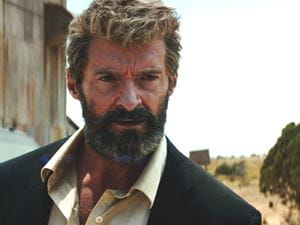
Some films don’t leave you at peace.
Some place upon you a burden, one that you’ll carry over the coming weeks and months. Even years later, a sight or a smell or a sound will bring this type of film to mind, and for the space of a moment, you’ll feel the weight of it, the discomfort of a world that is not as it should be. It is within this kind of film that art strips down the barriers between man and God, allowing us a chance at redemption by pushing us to find our purpose.
Logan is one of these films.
Directed by James Mangold, Logan is a far cry from the primary colors—both emotional and physical—that mark the typical superhero blockbuster. Audiences grown used to films like Avengers, or even Mangold’s previous stab at the X-Men universe, The Wolverine, are in for something very different with Logan. This is a film that looks more like Mad Max: Fury Road than Superman, and feels more like Shindler’s List than X-Men.
Logan begins at the bottom. Hugh Jackman plays the film’s titular character—also known as Wolverine—as he is in the year 2029. But this isn’t the Wolverine we remember from the X-Men’s glory days. No—this Logan is old. His powers barely function. He’s living in poverty and driving a limo to make ends meet. The warrior mutant who was once able to completely heal from all but the gravest of wounds in seconds now walks with a limp, is covered in scars, and is wracked by ominous coughing fits.
The film’s name is meaningful. Wolverine, the superhero, is gone. Logan, the man, is come.
It’s hard to see him this way. Wolverine is an icon, the epitome of the warrior who rushed headlong into every battle, claws out. He represented the courage that so many of us wish we had, and we like to think that this sort of courage is immortal, that it will always be there to inspire us.
It isn’t, and it won’t. Courage arises only from humanity, and like the cherry blossom, humanity blooms for a time, only to fall from the branch shortly after. And in acknowledging this, Logan does something no other superhero film has ever done.
It tells the truth.
There is a good reason why audiences love fantasy. We live in a fallen world, yet we yearn for something more, something higher, something better. C.S. Lewis once wrote that “If we find ourselves with a desire that nothing in this world can satisfy, the most probable explanation is that we were made for another world.” For Christians, this “other world” Lewis wrote of lies in Heaven.
Yes—there is a bridge between Logan and God, and that bridge is art. Mangold’s film isn’t a Christian movie. But in telling the truth through fantasy, the art of Logan gives a glimpse of the divine.
Superheroes are commonly beings of singular purpose—they are here to protect and defend, amidst other great deeds. But in the beginning of the film, Logan is without purpose. He’s barely getting by, living in a shed just across the Mexican border. He harbors some vague desires for the future, but it’s clear he doesn’t believe he’ll reach them. The man wants to die.
And it’s here that we are introduced to another major character. Logan features not only its namesake, but another beloved member of the X-Men—none other than its powerful, telepathic founder, Charles Xavier, masterfully played by Patrick Stewart.
Charles, too, is broken—moreso even than Logan is. Have you ever wondered what would happen if the most powerful telepath on the planet, a man who can control other people, wipe minds, and locate people all over the globe, were to suffer from dementia?
In Logan, you find out. And you’ll wish you hadn’t.
If it hurts to see Logan in a state of age and infirmity, it is utterly heartbreaking to see the fatherly Charles Xavier so, to listen as this once-great man babbles, to watch tears slide down his cheeks as he continually realizes, forgets, and re-realizes that his diseased mind is out of control, having hurt and killed all of the people he loves the most. Logan does his best to keep things under control by providing Charles with medication, but it is a losing battle against time and disease.
In Logan, there is no icon of courage. There is no font of comforting wisdom. There are only flawed, hurting people, just as naked to time as we are. This is the baseline of life. We live in a fallen world, subject to death and decay since our expulsion from Eden. We wander the Earth, seeking purpose, seeking something in the dust, and filling that void with anything we can get our hands on.
This is the point where much of Christian art fails. Too much of the time, it tends to zoom in on the aftermath of a life touched by God, and even then, only on the stories that continue to go well after this point. The abusive father gets saved and is re-accepted by his family. Or the promiscuous guy gives up his sex life for God. Everything’s okay. Everything continues upward.
But these aren’t truthful stories, and you’ll be hard-pressed to find God there. No—God is most present in those stories which start at the bottom, and sometimes return there over and over. Look at the history of the Israelites in the Old Testament. Really—go look at their story as a whole with open eyes, and you’ll see a natural patterns of ups and downs, of falling away from God and drawing back to Him, of rock-bottom death to beautiful life.
That’s actually a pretty good description of Logan. This is a world of negatives. This is a world that allows room for heroism, and depicts it as the beautiful rarity that it is.
Our clawed hero may begin at the bottom of this curve, but doesn’t remain without purpose for long—without spoiling an important plot point, purpose comes for him in the form of a very special young girl. He doesn’t recognize it. And at first, he rejects it. But in the end, he realizes it was what he’s been searching for all along.
Logan has always been an outsider amongst outsiders, but one who is constantly in search of redemption. In Logan, Hugh Jackman perfects the character that he’s been playing for nearly two decades, and does it so well, perhaps, because it is a struggle he is familiar with—in a 2015 interview with Parade Magazine, Jackman candidly asserted his Christianity, as well as the relationship between his art and his God. The man knows the synergy between sin and redemption.
And that knowledge seeps out in Jackman’s performance as Logan finally pieces together a place where he belongs—a family, of sorts. Without spoiling some major plot points, it is here, in this family, that Logan finally finds his purpose, and through that purpose, his redemption.
Logan's moments of redemption, found while protecting this family, are made so much the clearer because of the film's dark and gritty world—they're like fireworks in the night. He finally finds a reason to put someone else before himself, and it makes a difference in his life that makes things no better, in a way, yet makes them perfect in another.
In doing so, the film does something that Christian filmmakers should learn from. While never professing to be Christian, or spiritual, while never resorting to preaching or propaganda, Logan communicates its themes through actions, and through audiences recognizing that these actions were right—not because anyone says they're right, but by the effects of these right actions. Each one of Logan’s redemptive moments clearly shows the good that comes from making a moral choice, yet is realistic in the fact that these moral choices are never easy, and in a world that just doesn’t work right, may not even necessarily make things better.
It’s this last that truly breaks the mold of superhero films, leaving audiences uncomfortable. But they’re only uncomfortable because they’re suddenly aware that things aren’t right in their own world. It's broken. It is in need of change.
Logan doesn’t leave you at peace. That is its strength, for it is often as a result of discomfort that we change and create change. Like Logan, we rot from the inside out when we stagnate. We’re not meant for that—we’re meant for something more.
And like Logan, we simply have to say yes when that something comes along.

